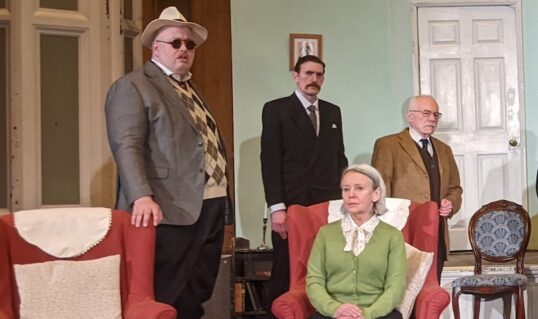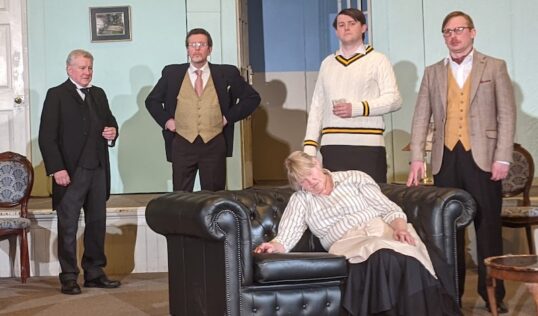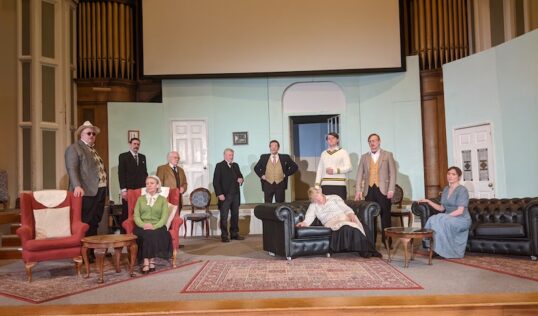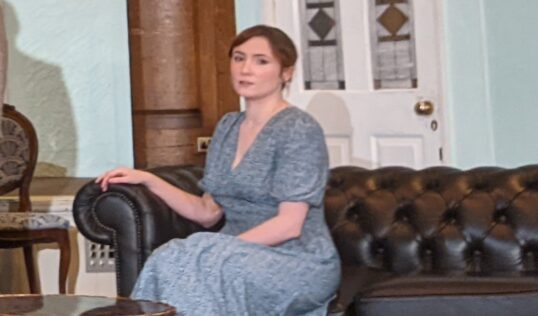And Then There Were None
★★☆☆☆ Patchy
Central Hall: Thu 16 – Sat 18 Mar 2023
Review by Hugh Simpson
Agatha Christie’s evergreen And Then There Were None is presented by Strawmoddie at the Central Hall, Tollcross, with delicacy and no little effort. Unfortunately, choices with staging – and problems seemingly inherent in the venue – make for an awkward experience.
An oddly assorted group of individuals of varying degrees of loathsomeness are invited to an island by the mysterious Mr and Mrs U N Owen. They are then told that they are to be held accountable for causing deaths. It is not much of a spoiler to say that they very quickly start being killed off, in accordance with the words of an old nursery rhyme.

Ben Blow, Matthew Jebb, Hilary Davies and Chris Pearson in Strawmoddie’s And Then There Were None. Pic: Strawmoddie
The book on which Christie’s own adaptation is based (and whose original British title was understandably too much for the US publishers, even in 1939) is apparently the best-selling mystery novel of all time.
The drama is certainly a beautifully structured piece, full of suspense and misdirection – particularly if it is done with enough pace to gloss over a couple of the holes in the ingenious plot. There are two versions with different endings knocking about, so even someone who has seen it before can be kept guessing to a certain extent.
A familiarity with the play is a definite advantage on this occasion, as otherwise quite a lot could easily be missed. The large main space at Central Hall is an unusual area for drama and the huge space has many things going for it. Unfortunately, a suitable acoustic for speech is not one of them. When used by the Book Festival for large events, the participants have been miked up, which goes some way to alleviating the situation; no such luck here.
completely lost
Whenever a character is facing anywhere other than directly forward, their words are at risk of being completely lost. When two people are sitting side by side having a conversation, each half of the audience has real difficulties hearing the character facing away from them, even in the front rows. And when a performer is facing away from the audience (which happens more often than is advisable), there is very little chance of making any of it out.
Even when the characters are front and centre, there can be a problem with the words echoing and simply being lost; in the first scene, the words of two out of the three people on stage are practically indecipherable.

Chris Allan, Michael Daviot, Wendy Mathison, Timothy Bond and Jonathan Whiteside in Strawmoddie’s And Then There Were None. Pic: Strawmoddie
This is largely the fault of the venue, but it can be overcome and is nothing to do with volume. As soon as Michael Daviot enters as Sir Lawrence Wargrave, the benefits of good old-fashioned enunciation soon become clear; everything he says is beautifully lucid, even when speaking quietly.
There are other benefits to Daviot’s performance, with his owlish demeanour and wonderfully contained presence commanding the attention throughout.
Not that the other performers are bad, even as some of them struggle against the venue. Matthew Jebb exerts a caddish fascination as the frankly appalling Captain Leonard, while Ben Blow’s William Blore has a compelling, unreserved air.
chilling tone
Hilary Davies gives the god-fearing Mrs Brent a chilling tone, while Jonathan Whiteside’s Dr Armstrong is a convincing bundle of nerves.
Chris Allan and Wendy Mathison are suitably put-upon as the servants, while Alice Pelan has a nice line in terror as secretary Vera Claythorne.
Chris Pearson’s portrayal of the crumbling General Mackenzie is well done, while Timothy Bond’s Anthony Marston is so frighteningly self-obsessed as a braying Bullingdon Club wannabe that you are almost praying for him to be the first victim. David Taylor’s boatman suffers from only appearing in the opening scene, when the play has not yet really got going.
Jebb and Whiteside’s direction makes full use of an expansive acting area, although this does lead to the auditory issues mentioned above. To this can be added some problems with visibility, as the sight lines in the auditorium are not always ideal when characters are sitting down.
interesting shadows
This reaches a peak in a scene where the house is supposed to be lit by candles. The extremely dim onstage lighting may be realistic, and does create some interesting shadows, but goes well beyond the atmospheric into the realms of the imperceptible.
That the audience have real problems both hearing and seeing what is going on at times is doubly unfortunate, particularly when such obvious care has been taken over the staging and performances. This does manifest itself in an almost stately, somewhat old-fashioned air to proceedings, but this is appropriate to the piece. Chris Allan’s work on the set and stunts gives the production a solidity and believability that help to counteract some of the staging difficulties.
In the end, however, the very real barrier to enjoyment that the sound problem in particular creates, means that this can never quite satisfy.
Running time: Two hours and 35 minutes (including two intervals, one of 20 minutes and one of 10 minutes)
Central Hall, 2 West Tollcross, EH3 9BP
Thursday 16 – Saturday 18 March 2023
Daily at 7.30 pm
Tickets and details: Book here.
Facebook: @strawmoddie
Twitter: @strawmoddie

Ben Blow, Matthew Jebb, Hilary Davies, Chris Pearson, Chris Allan, Michael Daviot, Wendy Mathison, Timothy Bond, Jonathan Whiteside and Alice Pelan in And Then There Were None. Pic: Strawmoddie
ENDS



















